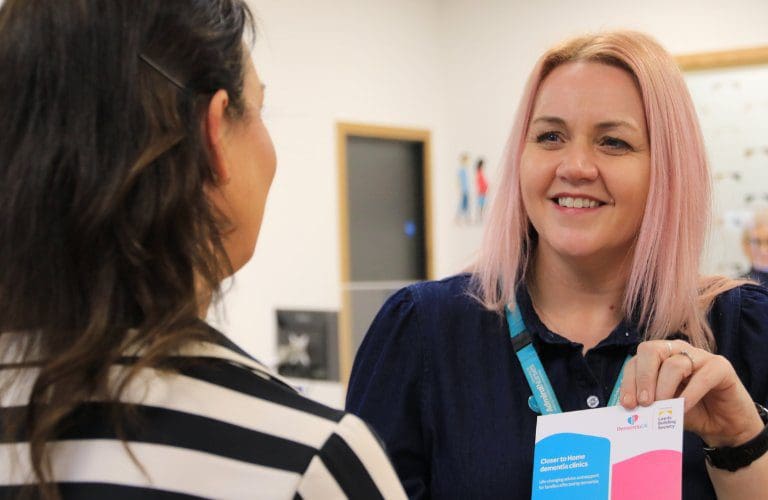
Closer to Home
Face-to-face clinic appointments with a specialist dementia nurse in a location near you.
During the International Year of the Nurse, one of our longest-serving Admiral Nurses, Loraine Butterworth, who is now based in Cumbria, has been awarded with a Queen’s Nurse title. The prestigious title, which is awarded by the Queen’s Nurse Institute, demonstrates which individuals have been striving toward, and have achieved, excellence in nursing in community care.
Loraine provides vital practical and emotional support to families living with dementia, both through her community role as an Admiral Nurse with the Royal British Legion and through work on Dementia UK’s national Admiral Nurse Dementia Helpline. She has been a nurse for 40 years and an Admiral Nurse for 20 years so this award has been a recognition of a lifetime of nursing for her.
Loraine’s career in nursing has predominantly been focused in dementia care, working in nursing homes, hospitals and day hospitals before becoming an Admiral Nurse. The teams she has worked in have won their fair share of awards including Manchester Women of the Year, Dignity in Care and Innovations in Nursing Practice.
Commenting on what Admiral Nursing and nursing in general mean to her, Loraine said: “I wanted to be a nurse from the age of six. To be honest, I never thought I could do anything else. Now I have become an Admiral Nurse, with absolutely fantastic support from Dementia UK, I am proud to say that our work is centred around building a relationship with the entire family.
“It is vital for families to feel they can trust someone throughout the progression of dementia, and to feel less alone in a condition where a lack of support can be incredibly isolating. Through working on the Admiral Nurse Dementia Helpline as well, I know that people come back repeatedly to speak to an Admiral Nurse due to our honest and reliable opinion. But it’s carers who deserve the praise too – they are often some of the most resilient people I have ever come across.”
Loraine has supported a number of families facing this tough condition. This has included Neil whose wife, Sarah (names changed to protect identity), was diagnosed with young onset Alzheimer’s. Sarah was at quite an advanced stage of the condition when they received support from Loraine. Sarah’s difficulties with eating and drinking became a major concern for the family, and led to drastic weight changes in Sarah. Loraine supported the family by encouraging the move to a pureed diet for Sarah to help with swallowing, along with ways to try and increase the nutritional content of meals, and the use of single coloured plates to help Sarah concentrate on what she was eating.
Loraine also provided Neil and the wider family with vital emotional support to allow Sarah to continue to be cared for in the comfort of her own home.
Another family supported by Loraine said: ‘At all times, as my wife’s condition deteriorated, I was comfortable that we were receiving quality care from someone who had a great deal of experience. It was obvious, from the start, that we would be told the truth and that supporting us in terms of our mental health and wellbeing was paramount.’
Given the onset of the pandemic, Loraine has seen her work increase significantly, particularly on the Helpline. Families with dementia have faced such challenges as not being able to visit relatives in care homes and being admitted to hospital at such an uncertain time. Support services have also been taken away and family members are reluctant to invite professional carers and other health and social care staff into their homes because of fear that they will contract the virus.

Face-to-face clinic appointments with a specialist dementia nurse in a location near you.

Call or email our Dementia Helpline/Alzheimer's Helpline for reassuring and practical advice from our specialist team of Admiral Nurses.